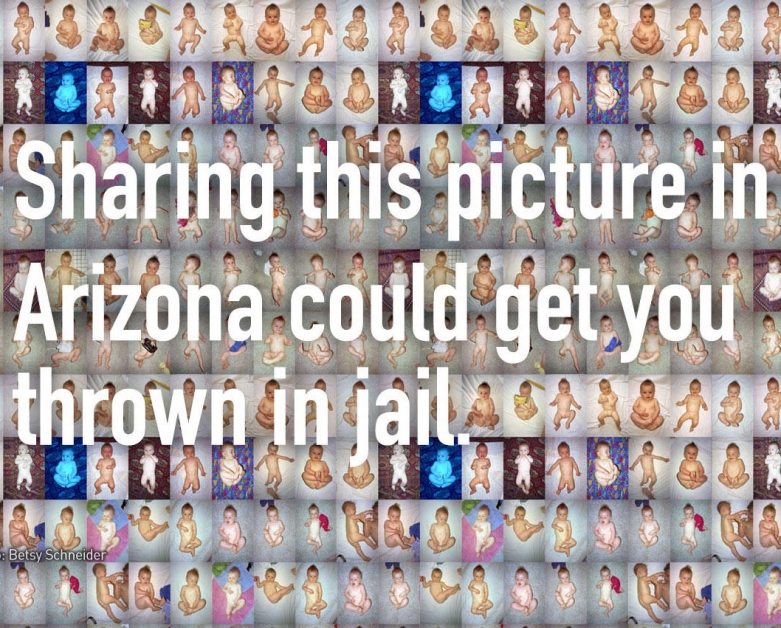VICTORY! Federal Judge Deep-Sixes Arizona’s Ridiculously Overbroad ‘Nude Photo’ Law
Page Media

Arizona is a little bit freer today.
With a federal court’s approval, we successfully settled our lawsuit over the state law that made our clients — booksellers, photographers, publishers, and librarians — risk a felony record for publishing images fully protected by the First Amendment. The plaintiffs in the case can now do their important work delivering newsworthy, artistic, and historical speech for us to enjoy — without risking years in the clink.
The Arizona law banned publishing any photo showing nudity or sexual activity, which was so broadly defined it included fully clothed simulated groping, without getting the permission of anyone pictured in the image. You shouldn’t need a permission slip to post images of horrific torture from Abu Ghraib or the “Napalm Girl” photograph that contributed mightily to changing American attitudes about the Vietnam War. These iconic images are obviously a far cry from “revenge porn,” in which a person maliciously invades a former lover’s privacy. But the Arizona law applied equally to both types of images.
Because of the law’s unconstitutional impact, we called it a “nude photo” law. But proponents of the bill called it a “revenge porn” law. That’s a pretty big difference. So what’s going on?
In drafting new laws — particularly new nonviolent crimes that regulate speech, threaten prison time, and can ruin a life — the details matter hugely. This law was extremely broad. It made you a felon if you shared an image of someone grabbing his fully covered crotch and mugging at the camera — even if he initially put it online for all to see. (Michael Jackson must be rolling over in his grave.)
And while this bill was sold as combatting “revenge porn,” it wasn’t limited to that awful conduct. For starters, the law didn’t require that the offender actually intend to enact “revenge” — in fact, the law had no intent requirement at all. Nor did the bill require that a person who posted an image know it was private, just that they “should have known” they lacked consent. (Pro tip: You always lack consent if you haven’t asked for it or been told.) Even the most well-intentioned laws can easily run afoul of the First Amendment if they aren’t carefully crafted with the Constitution in mind.
But, constitutional concerns aside, there is certainly reason to be concerned about revenge porn. Revenge porn is not just about free speech. It’s about women. That’s because the vast majority of real revenge porn is posted and shared online against the wishes and consent of women. It’s not that only women are featured in intimate pics and video s— it’s that our bodies are, disproportionately, a commodity for others’ entertainment. And images of nude women, consensual or not, spread like wildfire online.
Revenge porn victim advocates, who supported the law, tend to oppose intent requirements, which we think should be part of any bill likely to pass constitutional muster, noting that the humiliation a woman suffers increases every time a nonconsensual image is shared, regardless of the motives of the poster. That’s undoubtedly true. But the Constitution means making tough calls sometimes. That means opposing laws that chill or criminalize protected speech, even when we condemn the conduct that well-meaning legislators are trying to target.
The fact that we oppose laws like Arizona’s doesn’t mean we should throw up our hands over revenge porn. The misogyny that is so rampant online is a massive problem of a societal and sociological magnitude. We need to talk about it. And we do. As do revenge porn victims and their advocates. It’s a critical conversation that’s led to the likes of Google andReddit offering revenge porn takedown requests for the first time. That’s a huge victory — one achieved without a new criminal law and without a new inroad against the First Amendment.
And of course, when revenge pornographers violate existing criminal laws — for example, against stalking, threatening, or extortion — we need to enforce them. And we know, unfortunately, that crimes with female victims are underinvestigated and undercharged. That’s a tragedy, and one the ACLU advocates to change. And it also means we should think very carefully before expanding that system with a new, nonviolent felony for engaging in speech.
The bottom line? You can be a feminist and a free speecher too. We can protect women without enacting laws that overstep the Constitution. At the ACLU, we know that a strong First Amendment is not only compatible with equality but essential to its pursuit.
Lee Rowland is a Staff Attorney with the ACLU's Speech, Privacy & Technology Project.
Source: ACLU Speak Freely
